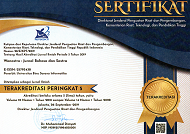The Implementation of Short Story in Enhancing Student’s Vocabularies
Abstract
Literary works have attracted more attention as a pedagogical instrument in enhancing vocabulary in recent years. Short stories refer to the learning media that is applied by the teacher to help the student in improving student’s vocabulary based on the context of reading a certain text. The Increased interest in a student-centered approach makes this short story received attention from a variety of studies. In the case of students must be more active in the learning process.The activity lets the students explore various new words, the content of the story and also sentence structure. The focus of the activity is to define and understand the words in a specific context based on the content of the text. This paper is a literature review from a previous study of short stories in English as a Second / Foreign Language context (ESL / EFL). The ten short story studies from the last ten years were widely reviewed and systematically analyzed. A short story from the study reviewed is about the quality of student vocabulary results in the context of EFL / ESL due to understanding vocabulary plays an important role in learning English. As a critical review paper of these studies, this paper highlights the obstacles faced during a teaching in improving vocabulary and the practicality of short stories as an effective pedagogical instrument in improving vocabulary. This study hopes that it can be useful and used effectively by educators in the ESL and EFL classrooms in the future.
Keywords: Short Story, vocabulary learning, learning and teaching activity
Full Text:
PDFReferences
Abuzahra, N & Farrah, M. (2016). Using Short Stories in the EFL Classroom. IUG Journal of Humanities Research-IUGJHR. Vol 24, No 1. 11-24. 10.12816/0023933.
Al-Dersi, Z. E. (2013). The Use of Short-Stories for Developing Vocabulary of EFL Learners. International Refereed & Indexed Journal of English Language & Translation Studies, Vol 1 (Issue 1)
Bakhodiruvna, A. M. (2015). Evectiveness of Teaching Vocabulary Through Short Stories. International Scientific and Practical Conference "WORLD SCIENCE", No 1(1)
Damayanti, I. L. (2017). From Story Telling to Story Writting, The Implementation of Reading To Learn (R2L) Pedagogy ToTeach English As A Foreign Language In Indonesia. Indonesian Journal of Applied Linguistic, Volume 6 No2, 229-242.
Eren, Z. (2004). The use of short-story in teaching English to the students of public high schools. H.Ü. Egitim Fakültesi Dergisi. 26, 41-47.
Zeraatkar, F & Hadipanah, M. (2013). The Effects of Short Story on Junior High School EFL Learners’ Reading Skills in Birjand. International Journal of Foreign Language Teaching, 1 (1), 1-9.
Ge, Z.-G. (2015). Enhancing Vocabulary Retention by Embedding L2 Target Words in L1 Stories: An Experiment with Chinese Adult e-Learners. Educational Technology & Society, 18 (3), 254-265.
Hassan, S & Mahkameh, A. (2013). The Effect of Storytelling on Children's Learning English Vocabulary: A Case in Iran. International Research Journal of Applied and Basic Sciences, Vol 5 (1), 104-113.
Lasaiba, D. (2015).The Effectiveness of Using Short Stories In English Teaching for PAI Learners of IAIN Ambon On Leraner's Perception. Jurnal Fikratuna, Volume 7 Nomor 2.
Krishna, M .T & Sandhya,K. (2015).The Impact of Short Stories on Teaching of English. Veda’s Journal of English Language and Literature- JOELL, 2(4), 58-62.
Pardede, P. (2011). Using Short Stories to Teach Language Skills”. Journal of English Teaching, Volume 1 Number 1, 14-27.
Parvareshbar, F. (2016).The Effect of Using Short Stories on Vocabulary Learning of Iranian EFL Learners. Theory and Practice in Language Studies, Vol. 6, No. 7, 1476-1483.
Ajideh, P. & Zohrabi, M. & Nouazad, T. (2014). The Effect of Summarizing Short Stories on Iranian EFL Learners’ Vocabulary Learning”. International Journal on Studies in English Language and Literature, Volume 2(Issue 9), 100-113.
Dolma, P & Boonprasiti, D. (2016). Short Story Reading as a Means of Enhancing Vocabulary, Using Vocabulary Self-Collection Strategy In English as a Second Language Among Seventh Graders Bhutanese Students. Proceedings of Academics World 51st International Conference, Bangkok, Thailand.
Rodríguez, G. L. (2017). students’ language skills develoPment through short stories. Íkala, Revista de Lenguaje y Cultura, Volume 2(Issue 1) 103-118.
Umasugi, R & Hanapi, H & Handayani, N. (2018). The Short Story Implementation To Improve Student’s Reding. 5, 48.
Wasik, B.A. & Bond, M.A. (2001). Beyond the pages of a book: Interactive reading and language development in preschool classrooms. Journal of Educational Psychology 93, pp. 243-250.
Koisawalia, H. (2005). Teaching vocabulary through rhythmic refrains. Cats – the YLSIG Newsletter, Spring. (2005).
Reddy, S. (2016). Importance of English Language in today’s World. International Journal of Academic Research, Vol.3, Issue 4(2)
DOI: https://doi.org/10.31294/w.v12i2.8668
Copyright (c) 2020 Nabila Myrrha Rahmawati

This work is licensed under a Creative Commons Attribution-ShareAlike 4.0 International License.
Index by:
Published by Department of Research and Community Service (LPPM) Universitas Bina Sarana Informatika by supported Relawan Jurnal Indonesia
Jl. Kramat Raya No.98, Kwitang, Kec. Senen, Jakarta Pusat, DKI Jakarta 10450

This work is licensed under a Creative Commons Attribution-ShareAlike 4.0 International License






